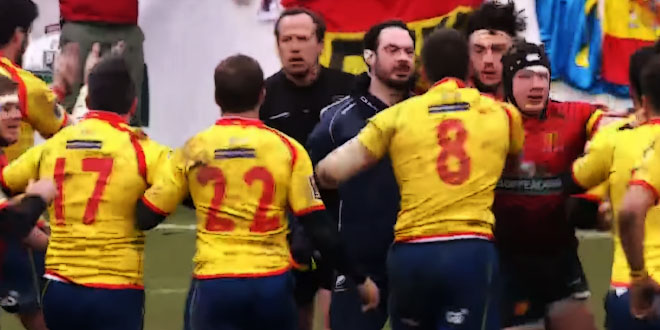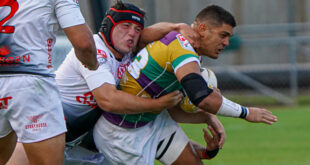On Saturday we witnessed Ireland make history with a Grand Slam finish of the Six Nations, arguably the world’s most prestigious rugby event outside of the World Cup. A day of celebration for the rugby world though decidedly somber for England rugby devotees. When we woke from the hangover on Sunday, what should have been another celebration – World Cup qualification for either Spain or Romania – was instead a horrific parade of ineptitude.
Let’s put the day into context. Simply put, Spain were one win away from qualifying for Rugby World Cup 2019. It’s a return 20 years in the making – Los Leones have only ever been to one such tournament, in 1999. Progress has been made in the country, it now boasts a semi-professional domestic league and the country will host the European Challenge and Champions Cup finals at Bilbao in May.
During the week the local media were feverishly anticipating the historic moment sure to come on Sunday, running images of Spanish rugby on the front page and cornering players for interviews. Spain were ranked 19th and Belgium 25th, not an insurmountable gap but given the relative performances of the two sides in the Rugby Europe Championship nobody was brazen enough to predict a Belgian upset.
Spain had beaten Russia and most notably Romania to upset the apple cart, Belgium were thrashed by both. The Romanians had been stunned by the defeat, a result that was destined to plunge them into a series of playoffs with considerable uncertainty. Long-time coach Lynn Howells announced he would step down and the players were resigned to their fate.
Romania were also playing on the weekend, but against Georgia. With the Lelos already qualifying on the back of their performance at the 2015 World Cup, the games against Georgia did not count towards the European qualification. Only a Belgian victory could save them from purgatory, and that was beyond even their own scope of imagination. As the idiom goes, however, the game is not played on paper.
When the final whistle blew the score read Belgium 18, Spain 10. An astonishing result. Belgium had pulled off the impossible, or at the very least Spain had collapsed under the pressure. Romania were into the World Cup by the skin of their teeth and the Leones were now destined for a far less desirable path that will see them face the challenges of Portugal, Samoa, and Canada. A loss to the first or last denies their seat at the table in Japan.
That’s the narrative that should have been. The real story is far more entangled.
It may be that all of the above is correct but the circumstances in which it unfolded are very far from reasonable. The penalty count at the close of the match was Spain 18, Belgium 7. At the 60 minute mark, with Belgium leading 15-0, the penalties were 16-3. In any match that is unbalanced. Either Spain were categorically undisciplined or the referee has had a shocker, or perhaps both.
Unfortunately for all involved the story is also not merely a bad day at the office for the match officials. Vlad Iordachescu was the man in the middle on Sunday. His assistants were Radu Petrescu and Alexandru Ionescu. As one might quickly surmise, all three were Romanian. This fact was not hidden. Petrescu and Ionescu brandished Romanian Rugby Federation (FRR) track suits while patrolling the sidelines.
This obviously did not sit well with the Spanish players. They were visibly frustrated with the officials throughout the match and when Iordachescu signaled full-time they descended en masse on the referee. The verbal confrontation was bad enough, but more than one player could be seen making physical contact with the officials.
Regardless of the situation that is never acceptable in any sport, particularly in rugby where respect for the officials is sacrosanct. Both the Spanish Rugby Federation (FER) and their captain – Jaime Nava, who was injured and did not play in the match – have since made statements declaring the actions regrettable.
That is not enough. The FER must make a formal and public apology to Mr. Iordachescu and his crew. The players directly involved should be severely reprimanded and those who made contact with the officials suspended. An emotional response is one thing, physical intimidation is crossing the line.
However unpleasant, there is also a sense of sympathy for the Spanish players for the outcome of the match. The question is very clear: how could World Rugby have appointed Romanian officials for a match when their impartiality was so obviously compromised?
As it turns out, they didn’t. Despite this being a qualifying match for World Rugby’s flagship event the match official assignments were left under the control of Rugby Europe, as is the case for all Rugby Europe Championship matches. This in itself seems an incredible oversight on the part of World Rugby and is assuredly a situation that will be immediately changed pending the incoming review. If the perceived competence of the world governing body has suffered a blow, that of Rugby Europe has been completely shattered.
If you ask players at any level of sport which referee they prefer the answer will always be “the best one.” At club level there are often situations where impartiality may be somewhat cloudy, but explicit approval by both teams is given and the games go on.
At international level this situation is always avoided. Yes, in second-tier matches the assistants can be local appointments such as seen in the Americas Rugby Championship, but the referee is impartial. Any administrator with an iota of common sense would have recognized that having a Romanian in charge of the match on Sunday could be contentious.
This was certainly not lost on the FER. In a public statement they confirmed that an appeal was made on February 19 to the President of the Rugby Europe Referees Commission – Patrick Roben – to change the assignments for this match given the obvious conflict of interest. Evidently this appeal was denied. According to the FER the reason was simply given that the assignments had been made prior to the tournament and they would therefore not be changed.
An official statement from Rugby Europe came on Sunday:
“As for other international major competitions, referees’ appointments for Rugby Europe Championship have been made ahead of the competition by an independent and neutral skilled committee (no Rugby Europe board members involved). It has been reviewed and confirmed during the tournament based on referees’ performance at international level.
“While we appreciate that this is a subject of high-emotion, it would be inappropriate to comment on match official performance before the usual full review has been undertaken. This is usual procedure and occurs for every match.”
This is an incongruous statement. Not only are Rugby Europe attempting to deflect responsibility to an ‘independent committee’, they are completely ignoring the question. Why was the appeal for change denied? To suggest that this was not possible is an affront to rationality. Just days ago Marius van der Westhuizen – an assistant referee – was removed from a Six Nations match after attending training with England during the week. Is Rugby Europe seriously trying to claim that a month’s notice was insufficient to make a change that was entirely appropriate?
To make matters worse, taking charge of the Germany vs Russia match on the very same day was RFU senior panel referee Ian Tempest, accompanied by fellow Englishmen Simon Harding and Chris Sharp. This match took place at the Sportpark Höhenberg in Cologne, a mere 225km away.
There is another fact that is despairingly relevant to the mess. Sitting at the head of Rugby Europe is Octavian Morariu. You guessed right. He is also Romanian. To call the circumstances suspicious is a gross understatement. At best this is incomprehensible negligence.
Let us, for the sake of sanity, avoid the path of conspiracy. Indeed to suggest that Mr. Iordachescu and his assistants were complicit in a plot to ensure Romania’s presence at the World Cup is as dark an avenue as can be pursued in the fallout. World Rugby have today declared an investigation into the match and Rugby Europe have also added a comprehensive analysis of the match to their agenda for Friday’s selection committee meeting in Poznan. Rest assured nobody will take the results of the latter seriously outside of the persons participating.
If we preemptively assume that collusion has not taken place, what happens next?
Rugby Europe, despite their ridiculous assertions, have a duty of care to ensure results are beyond reproach. Regardless of prior assignments Spain’s request for a change of match officials should have been granted without a moment’s debate.
In this simple act they would have avoided all controversy. Their actions – or lack thereof – have proved catastrophic. The reputation of Mr. Iordachescu has been forever damaged; the players of Spain, Romania, and Belgium have been denied an unsullied conclusion; and Rugby Europe have unequivocally brought disrepute to the sport itself.
The positions of Mr. Morariu and Mr. Roben are now untenable. Their resignation should come with immediate effect. If there were others involved in the decision to deny the FER’s request they must also be removed. World Rugby must immediately take control of World Cup qualifying appointments and must maintain oversight over the program from this day forward. The buck stops with them and there is no acceptable alternative.
On the match itself, that is another matter entirely and one that will require significant and uncomfortable debate. To order a replay of the match would imply that the referee has affected the outcome either by incompetence or intention. If World Rugby’s conclusion is that the referee adjudicated the match fairly, the result must stand.
World Rugby could opt for a new match to be played between Spain and Romania at a neutral venue, seeing as they are the two teams directly affected. Of course the FER might argue that they have already beaten Romania, and their task was to defeat Belgium, and they would be correct.
Irrespective of competency what’s clear is that Romanian officials should not have been appointed to the match once it was determined that the fate of their nation’s inclusion in the World Cup was potentially at stake, and the repugnant scenes in Brussels on Saturday were unquestionably avoidable. Sadly finding a resolution free from further controversy is not possible. A dark day for rugby indeed.
 Americas Rugby News Rugby news from across the Americas!
Americas Rugby News Rugby news from across the Americas!




